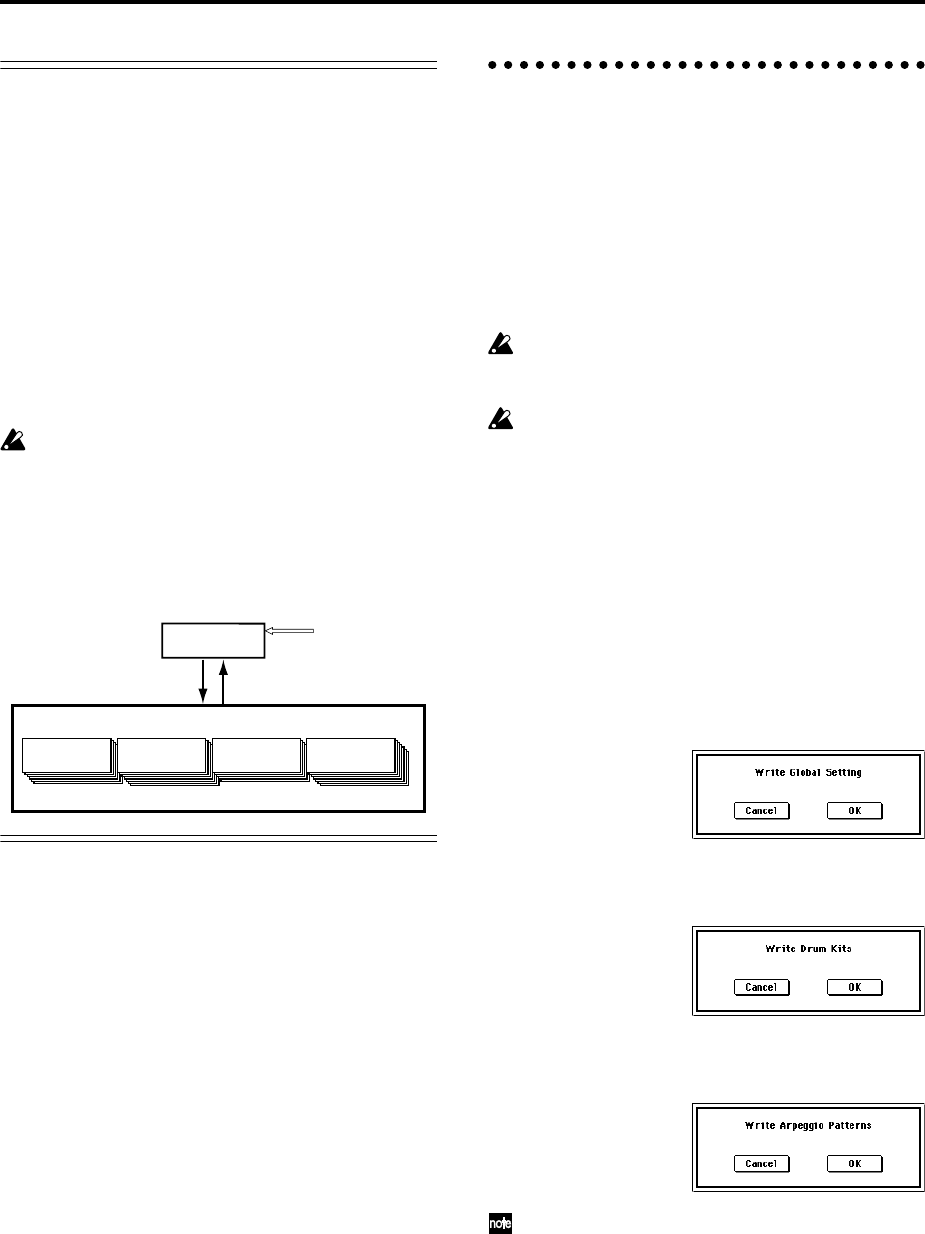
58
About the Edit Buffer
When you select a program or combination in Program
P0: Play and Combination P0: Play, the program or combi-
nation data is called into the “edit buffer.”
When you modify the parameters in P0: Play or in the Edit
pages P1–P9 of Program mode or Combination mode, the
changes you make will affect the data in the edit buffer.
If you wish to save this modified data into internal mem-
ory, you must perform the Write operation.
When you perform the Write operation, the data in the
edit buffer is written to the specified program number or
combination number of the specified bank.
If you select another program or combination without
writing, the data of the newly selected program or combi-
nation will be called into the edit buffer, and your changes
will be lost.
When you press the [COMPARE] key in Program
mode or Combination mode, the data from memory
(i.e., the contents that were written into memory) will
be temporarily called into the edit buffer. This allows
you to compare the settings you are editing with the
original un-edited settings.
Writing global settings, user drum kits,
and user arpeggio patterns
The settings you edit in Global mode can be written into
internal memory. This is done using the operations Write
Global Setting, Write User Drum Kits, and Write User
Arpeggio Patterns. If you wish to use these edited set-
tings after you turn the power off, be sure to write the
data first.
There are two ways to write global settings, user drum
kits, and user arpeggio patterns.
Before you write a user drum kit or user arpeggio
pattern, the Global mode memory protect setting
must be turned off (☞“Memory protect”).
The user arpeggio pattern parameter settings
“Tempo,” “Pattern,” “Octave,” “Resolution,” “Sort,”
“Latch,” “Key Sync,” and “Keyboard” are set inde-
pendently in the Program, Combination, and Song
modes. These settings are not saved when you per-
form the Write operation described here.
If you have edited these parameters in Program or
Combination mode you must return to that mode to
write them.
Using a page menu command to write
1 To write global settings (the various settings in Glo-
bal P0–P4), press the page menu command “Write
Global Setting” in Global P0–P4.
The Write Global Setting dialog box will appear.
To write user drum kits, press the page menu com-
mand “Write Drum Kits” in Global P5.
The Write Drum Kits dialog box will appear.
To write user arpeggio patterns, press the page menu
command “Write Arpeggio Patterns” in Global P6.
The Write Arpeggio Patterns dialog box will appear.
The same dialog box will also appear if, in each of the
above pages, you hold down the [ENTER] key and
press the [0] key.
2 To execute the Write operation, press the OK button.
To cancel, press the Cancel button.
When you press the OK button, the display will ask
“Are you sure?” Press the OK button once again to
write the data.
When you write, the program or
combination settings will be
saved in internal memory.
When you select a program or
combination, its data is called from
internal memory into the edit
buffer.
Editing applies to the data in the edit
buffer. Programs or combinations will
play according to the data in the edit
buffer.
Edit Buffer
Write
Select
Internal Memory
Edit
Program
Bank INT-A 0...127
Program
Bank EXB-A 0...127
Combination
Bank INT-A 0...127
Combination
Bank EXB-A 0...127


















